- Home
- Anne Stuart
Housebound Page 10
Housebound Read online
Page 10
Before he could touch her she turned, and the illusion was shattered. Bright blue eyes looked up into his, startled, instead of those limpid green ones he’d hoped to see. The blond curls seemed brassy and artificial in place of the black silky mane, and her face looked young and petulant and discontented.
Noah dropped his hand back on the wheel and pressed down harder on the gas. “What went on this weekend?” Holly questioned in a blandly curious voice.
“You showed me around the house,” he answered flatly. “I talked with your father about a tentative schedule, we argued a bit about money and I made my decision. You know all that.”
“I was talking about what happened between you and my sister.”
Noah kept his eyes glued to the highway. “What in the world makes you think something happened?” he countered.
Holly laughed. “I’ve known Anne all my life, Noah. I’m not obtuse. Self-centered, yes; obtuse, no. There was something going on between you and Anne or I know nothing about men and women. And I assure you, I know a very great deal. What was it—love at first sight?”
Noah counted to ten, tapping his long fingers against the steering wheel. “You’d like that, wouldn’t you, Holly?”
“Not particularly.” She slid down farther in the bucket seat, eyeing him with a mischievous glance. “I don’t like being turned down in my sister’s favor. And you did turn me down, didn’t you, Noah? No matter how tactful you tried to be.”
“I didn’t sleep with your sister, Holly.” He carefully avoided answering her question.
“Of course you didn’t. I told you, I know my sister very well. She’s always so good, so pure, so strong.” The bitterness in her voice sounded like that of a spoiled child. “I don’t think she’d recognize a less than noble impulse, even if she was decadent enough to have one. Saint Anne of Lambertville.”
Noah sent her a curious glance. “Why are you jealous of your sister? On the face of it, you have everything and she has nothing.”
Holly laughed, an unhappy little sound. “All that’s true. Do you think I’m going to deny it? But things are never as they appear. Anne never makes foolish mistakes. Anne can do anything. And Anne…” Her voice broke, and she turned her profile back out toward the countryside.
“And Anne has Wilson,” Noah completed gently. This time he did move his hand from the steering wheel, reaching out to take her unresisting one in a comforting grip.
“Yes,” Holly said. “Anne has Wilson. Stupid, isn’t it? I can have any man I want.” She shot an apologetic glance at him. “Well, almost any man. And for the last ten years I’ve been desperately in love with a stodgy banker who disapproves of me and is unimaginative enough to think he’s in love with my sister.”
“And you don’t think he is?”
“Of course not. Anyone with eyes could see that it’s me he loves, not Anne. Anne’s more like a sister to him. I never thought he’d be foolish enough to ask her to marry him. I thought I had enough time. I thought he’d wait.” She gave herself a tiny shake, flashing her brilliant smile at Noah. “My mistake, I suppose.”
There was a long silence. “You know that if you take her house away all she’ll have left is Wilson,” he said finally.
“I know.”
“And from what I’ve seen of Wilson he’s a perfect little gentleman. Even if he discovered he was in love with you after all, he won’t abandon her when she loses the house.”
“I know,” Holly said again. “But I have to take the chance. Anne can’t hold out against the ravages of time much longer. In another few years the house will collapse about her ears.”
Noah managed a forced grin. “Maybe the foundation should offer less.”
“We won’t take less,” Holly said firmly. She turned back to face him. “So what did happen between you and my sister?”
Once more he avoided a direct answer. “Do you think I’ll take her off your hands and assuage your conscience? You picked the wrong man, lady. I won’t be seeing her again.”
“You finished your work?”
“I found out what I came to find out,” he said.
“And what will your recommendation be?” she asked in her breathless voice.
“I’m going to recommend that the foundation offer your asking price,” he said flatly, trying to ignore the feeling of betrayal that swamped over him.
“And will they?”
“They wouldn’t have sent me down if they didn’t trust my opinions,” Noah drawled. “They’ll buy your house.”
Holly nodded, leaning back against the leather seat, averting her profile once more. He stared at her in the gathering dusk, once more giving in to the dangerous fantasy. That gold hair looked dark in the shadows; the slightly voluptuous breasts were smaller and prettier. He could imagine her voice, husky, without that breathless little giggle that Holly affected most of the time.
But that mass of curls could be dark-brown, couldn’t it, he thought suddenly, unwillingly. Those averted eyes could be warm and brown and reproachful, and the full mouth could tell him how he’d failed her. It could be, should be, Nialla there beside him. What was he doing there, driving with one woman, dreaming of another, with no place for his guilt-ridden memories of Nialla? Once again he’d failed her.
“Are you really not going to see her again?” Holly’s voice broke through his sudden, tortured thoughts.
“Who?”
“My sister,” Holy said impatiently. “You said you’d finished your work and wouldn’t be seeing Anne again. Did you mean it?”
He could imagine Nialla still, watching him out of those lost eyes of hers. “I meant it,” he said.
“In that case,” Holly said lightly, “why don’t you spend the night with me?”
He pulled himself out of his abstraction with a shot of laughter. “Forget it, Holly.”
“Why?” She was undeterred. “We’ve both had a celibate weekend. How about a nice bit of recreational sex to take the edge off?”
And suddenly the feel, the sound, the scent of Anne came back to him as she lay curled up in his arms, and a surge of frustrated wanting swept over him, a wanting so strong that he was almost tempted. In the dark it would be easy enough to pretend she was her older sister. The long drive back had taught him there was at least a minor resemblance. He could ignore the fact that she doused herself with some heavy, musky fragrance instead of the sly, delicate scent of roses that clung to Anne’s skin. And he knew from bitter experience that it was only when he was in bed with another woman that the memory of Nialla left him alone.
But he couldn’t do it, tempted though he was. “I think,” he said, “that you’re going to have to cut back on your recreational sex if you want to win Wilson.”
“I was going to pretend you were him,” Holly said, unabashed.
“I’m sure you were,” he said with a resigned grin. “And I would have pretended you were…someone else. But that’s not a healthy way to enjoy recreational sex, Holly. At least, not as far as I’m concerned.”
“But you don’t want me?” she pursued, and he could hear the thread of anxiety in her voice.
He responded like a gentleman. “Of course I want you,” he lied, then wondered if it was a lie. Those few minutes on Anne’s narrow bed had left him in a damnably frustrated state. Holly would be more than adept at relieving that situation. “But it would be a mistake for both of us,” he continued doggedly.
“I suppose so.” She leaned back, subsiding, her momentary insecurity assuaged. “And you’re not going to see Anne again?”
“I’m not going to see Anne again,” he agreed. And this time he knew he lied.
IT WAS A QUIET NIGHT in the old house. Proffy had fed himself, amid much grumbling, and gone to bed early. There was an echoing, peaceful stillness as Anne wandered through the empty rooms. She could hear the steady drip of the snow melting off the roof, and knew she should go up to the attic to check the leak above the bathroom. And she knew for the first time in her li
fe she was going to let her responsibility to the house lapse. She was too tired and too disturbed after the upheaval of the weekend—she needed a small bit of time to herself. The roof would have to wait.
For the thousandth time she thanked heaven that she’d had her mother’s spinet moved to the tiny room off the kitchen. The Bechstein grand in the library was a better instrument, but it sat directly below Proffy’s bedroom, and the wood-paneled walls served as sounding boards to carry the rich sound throughout the house. The small antique spinet suited Anne perfectly, and if the rough plaster walls bounced the sound around, she didn’t mind. She had every intention of playing for hours that night, with none of her perfectionist relatives to suggest or criticize, to point out a fumbled note or a blurry passage. She was going to pound and thump and soar, she was going to play Chopin with all the sentimental flourish her mediocre talent could command, and as she played she had every intention of indulging herself in a good, hearty fit of tears as she thought about the loss of Noah Grant.
And tomorrow morning she was going to return to work, putting all distracting thought of a Celtic Gypsy face out of her mind, and play only cheerful, mathematical Bach in the small hours of the morning. But for now she was going to cry.
Chapter Seven
“Damnation!” The plate slipped out of her grasp and went sailing onto the stone floor in a tangled mass of broken china, scrambled eggs, toast, butter and jam. Bits of food spattered Anne’s bare ankles, and it was all she could do to control the uncharacteristic urge to burst into tears.
“Was that the good china?” Proffy inquired grumpily from the doorway, his full plate of breakfast in his hand. He preferred to have it delivered to him in the dining room, not to have to fetch it like some damned maid, but Anne had been increasingly demanding the last few weeks. If things kept on this way, she’d have him washing his own dishes and making his bed.
“It was.” Her tone of voice encouraged no further discussion, but Proffy had always been obtuse with his middle child.
“Let’s see, that would give us approximately four plates left out of a service of twenty,” he announced, his voice heavy with sarcasm. “That was my mother’s Wedgwood, Anne.”
“It gives us three plates out of twenty-four, and I know perfectly well where it came from,” she said, her voice a combination of weariness and temper. It was a tone she’d found herself using far too often in the past two weeks, but she couldn’t seem to help herself.
Proffy’s bushy white eyebrows rose in surprised dismay. “You’ve been in the foulest mood lately,” he complained. “I don’t know what’s gotten into you these past few weeks. You never used to be so touchy.”
Anne surveyed her father with jaundiced eyes, then relented. “Sorry, Proffy. I think it must be cabin fever.”
“I thought people only got that when they’re snowbound,” he argued.
“Or housebound.” Anne sighed, squatting down to pick up the larger pieces of plate mashed in with the food. “It feels like I’ve been here forever. I think I need a vacation—it’s just too bad I can’t afford it.”
With her head bent she couldn’t see the hopeful light that leaped into Proffy’s bespectacled eyes. “You should get out more,” he said gruffly. “You’ve spent far too much of your time devoted to this old pile of stones. It’s not healthy, Anne. You should be out enjoying yourself, not slaving away trying to keep a roof over our heads.”
“Speaking of roof, the south side is getting worse,” Anne said shortly. “I may have to reapply for a loan if it gets much worse. You’ll have to cosign, of course, and so will either Holly or Ashley.”
“You may run into some trouble there.”
Anne looked up from her position on the floor. “What do you mean? The roof is leaking, it needs fixing, and I haven’t saved enough money. No bank will give me a loan unless the legal owners of the house sign for it. You know as well as I do that any three of us constitute legal ownership.”
Proffy put his plate down on the oak table, and his voice was unusually kind. Dangerously so, Anne thought. “You can’t keep pouring money into the place, Anne. It’s a losing battle—you’ll have to face it sooner or later, and the sooner you do, the happier a life you’re going to lead. Holly and Ashley have accepted it, and I learned long ago that we wouldn’t have the old place forever. You can’t stop the ravages of time, Anne.”
“Are you quite finished, Proffy?” Her voice was cool, studiously polite and quite furious.
Her father shrugged. “You won’t listen, of course. You are as stubborn as your mother was. Heaven protect me from such difficult women. I’m going out for breakfast.” He fixed a disapproving glare at her blank face. “And if you want to know where I’ll be today, you can find me at a place that offers peace, quiet and convivial companionship.”
A reluctant grin broke through Anne’s worried expression. “Oh, the Merry Widow. Give Mrs. Morgan my love. Will you be back in time for dinner?”
“I’ve told you children I don’t like that nickname,” he fretted. “And no, I won’t be back for dinner. I may not even be back till tomorrow morning.” He said it with a little boy’s defiance, and Anne’s amusement temporarily banished the last of her worries.
“Heavens, she is living up to her nickname!” She laughed. “You’d better be careful with such a wanton, Proffy.”
“You wouldn’t know a wanton if you saw one,” he said stiffly, his dignity much affronted. “You’ve been a sore disappointment to me as a daughter, Carrie.”
All of her amusement fled. “Why? Because I haven’t been properly wanton?”
“Now is neither the time nor place to go into it,” he said ominously. “But you’re going to have to change your attitude, young lady. You can’t always have it your way. Your comfortable little life is going to have to go through some upheavals, and it’s the best thing that could happen to you.”
Anne eyed him steadily. “So you’re not about to enumerate my failings as a daughter?” Her voice was deceptively cool.
“Look at the talent in this family!” he burst out unwisely. “Look at Holly, look at your brother! Wonderful artists, with international reputations! Your mother was a concert pianist. Even I was the foremost expert on Baroque quartets in my day. You come from a line of such talent, such accomplishments, and what do you do with your life? Devote it to a rotting old house.”
Anne had heard all this many times before. For the first time she felt like fighting back, trying to explain some bit of her choices to him. “Did it ever occur to you that I might not have inherited the amount of talent the others did?”
“Nonsense! Of course you did.”
“Everyone can’t be brilliant, Proffy,” she persevered. “There always has to be at least one loser in the litter.”
“You didn’t even try! You refused to continue studying the flute when you were twelve, gave up the piano by fifteen, and threw away your paints. You had promise, Anne, and you refused to follow through. You tossed it all away.”
Anne stared at him blankly. Her studio was off limits to her family—none of them knew of the delicate, hopelessly romantic watercolors that lay neatly under the daybed. No one heard her playing the piano late at night—strange, haunting melodies of her own creation amid the thundering classics she had committed to memory during her years of study. And if she had her way, they would never see or hear them, the children of her creativity that she knew could never compare with her siblings’ magnificence.
“Promise wasn’t good enough, Proffy. I simply refused to be mediocre in a family of greatness.” She shrugged, managing a rueful smile as she dumped the broken plate and the food into the trash. “I’ve made my life and I’m happy with it. Why can’t you accept that my way is different from the others?”
“Because I wanted to be proud of you, just as I am of the others. I didn’t expect you to reach your brother’s and sister’s heights, I just expected you to make use of your talents. But you refused. You’re so strong, Anne
. And yet you’re a coward and a quitter. And I’m ashamed of you.” Turning on his heel, he stalked out of the kitchen.
Anne stood there, listening to his footsteps die away, a curious numbness settling in around her heart. Picking up his full plate, one of the last three Wedgwoods, she started automatically for the trash bin. She looked down at the plate, then out into the rainy spring morning. Whirling around, she flung the plate against the kitchen wall, the crash of the china and the wet slap of the eggs easing a small part of the knot in her stomach.
“Damn you, Proffy,” she said aloud, calmly enough. “Damn you to hell for being right.” And ignoring the mess all around her, she stepped carefully around the broken china and went into her studio, slamming the door behind her.
HER HANDS WERE SHAKING, Anne realized wearily as she propped herself up on the sofa and surveyed the mess her studio was in. It had been a rough two weeks, and that final confrontation with her father had been the last straw. A quitter and a coward, he’d said, judging her as he’d always judged her and found her wanting. Well, he was right, as usual. Except that she wasn’t nearly as strong as everyone supposed.
Her room was littered with half-finished projects, a sign of her preoccupation since that damnable house party. Not a single project had she finished in all that time, with the lone exception of the cursed Chinese manuscript. For the past ten days she had been trying to plow through an incredibly technical treatise on tropical diseases, and the words flew at her fast and furious, with the unlikely names of schistosomiasis, trypanosomiasis and yaws. She could only manage a few pages at a time without her head aching, yet she’d promised Edmund it would be done by Tuesday. And never had she felt less like working.
Well, she wasn’t going to spend her weekend worrying about Proffy, worrying about her own failings, and most of all, worrying about Noah Grant, who had vanished from her life with what ought to be reassuring dispatch. She had her work cut out for her. First, the damned manuscript. Add to that the absolute necessity of doing something about the huge hole in the south side of the roof, and she could look forward to falling into an exhausted sleep. Which was something she hadn’t enjoyed in quite a while. No sooner would her head touch the pillow than thoughts of what she could have done, should have done, filled her brain, keeping her wide awake into the early hours of the morning.

 Ice Blue
Ice Blue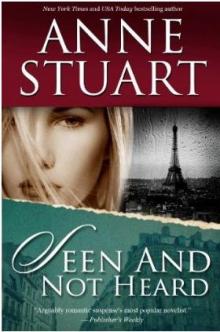 Seen and Not Heard
Seen and Not Heard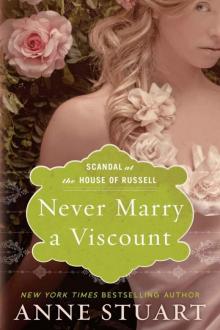 Never Marry a Viscount
Never Marry a Viscount Heartless
Heartless The Devil's Waltz
The Devil's Waltz Hidden Honor
Hidden Honor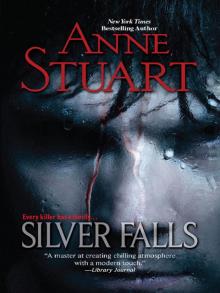 Silver Falls
Silver Falls Fire and Ice
Fire and Ice Nightfall
Nightfall Never Trust a Pirate
Never Trust a Pirate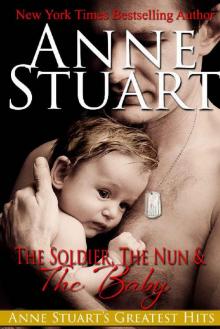 The Soldier and the Baby
The Soldier and the Baby Still Lake
Still Lake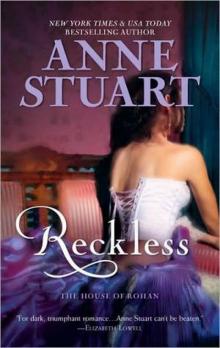 Reckless
Reckless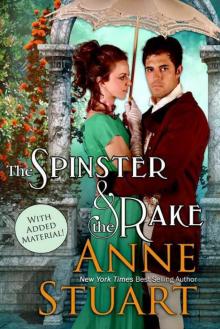 The Spinster and the Rake
The Spinster and the Rake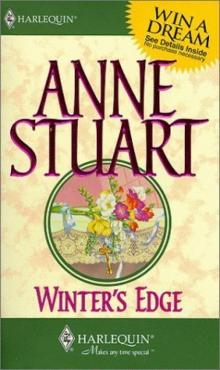 Winter's Edge
Winter's Edge At the Edge of the Sun
At the Edge of the Sun Into the Fire
Into the Fire Night of the Phantom
Night of the Phantom Ritual Sins
Ritual Sins Darkness Before the Dawn
Darkness Before the Dawn Against the Wind
Against the Wind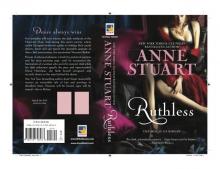 Ruthless
Ruthless The Catspaw Collection
The Catspaw Collection Escape Out of Darkness
Escape Out of Darkness The Widow
The Widow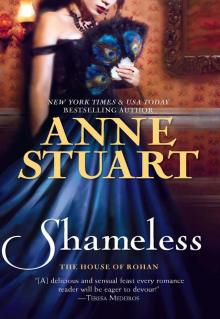 Shameless
Shameless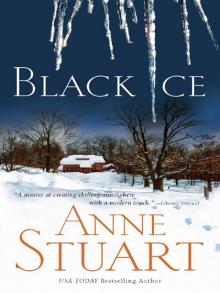 Black Ice
Black Ice Breathless
Breathless Shadows at Sunset
Shadows at Sunset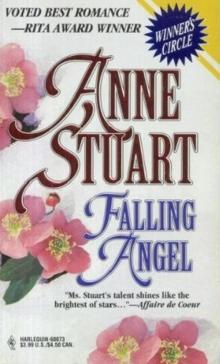 Falling Angel
Falling Angel Housebound
Housebound Cold as Ice
Cold as Ice The Wicked House of Rohan
The Wicked House of Rohan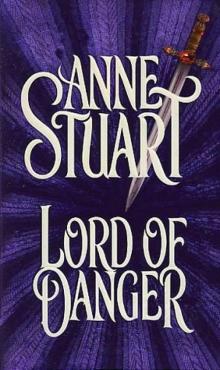 Lord of Danger
Lord of Danger The High Sheriff of Huntingdon
The High Sheriff of Huntingdon Wildfire
Wildfire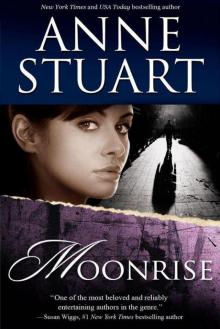 Moonrise
Moonrise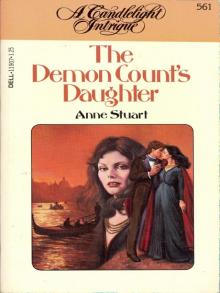 The Demon Count's Daughter
The Demon Count's Daughter Date With a Devil
Date With a Devil To Love a Dark Lord
To Love a Dark Lord Driven by Fire
Driven by Fire Special Gifts
Special Gifts Ice Storm
Ice Storm Shadow Lover
Shadow Lover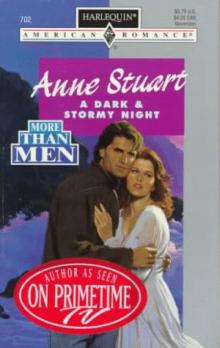 A Dark & Stormy Night
A Dark & Stormy Night Now You See Him...
Now You See Him...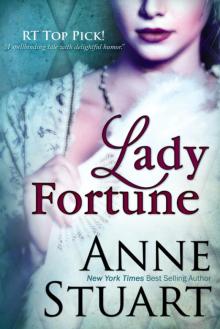 Lady Fortune
Lady Fortune Glass Houses
Glass Houses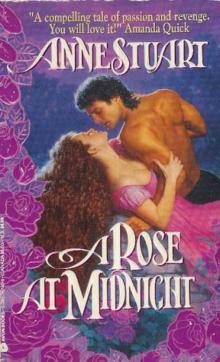 A Rose at Midnight
A Rose at Midnight Prince of Swords
Prince of Swords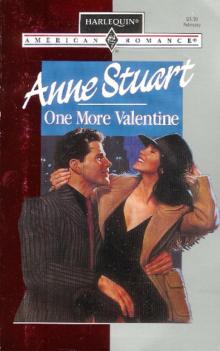 One More Valentine
One More Valentine Return to Christmas
Return to Christmas Tangled Lies
Tangled Lies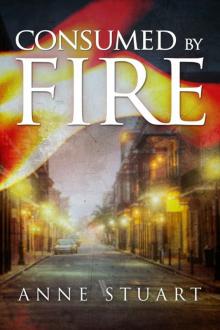 Consumed by Fire
Consumed by Fire The Fall of Maggie Brown
The Fall of Maggie Brown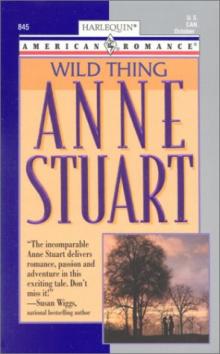 Wild Thing
Wild Thing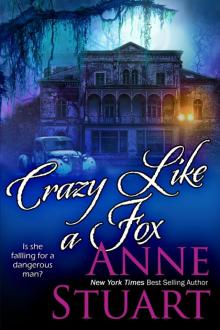 Crazy Like a Fox
Crazy Like a Fox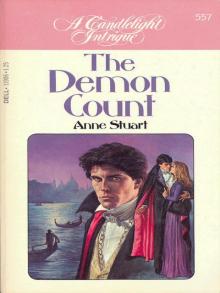 The Demon Count
The Demon Count Prince of Magic
Prince of Magic Wildfire (The Fire Series Book 3)
Wildfire (The Fire Series Book 3)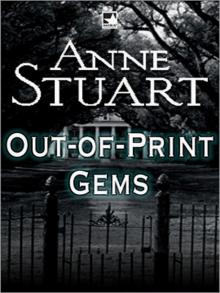 Anne Stuart's Out-of-Print Gems
Anne Stuart's Out-of-Print Gems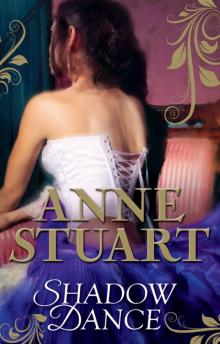 Shadow Dance
Shadow Dance Under an Enchantment: A Novella
Under an Enchantment: A Novella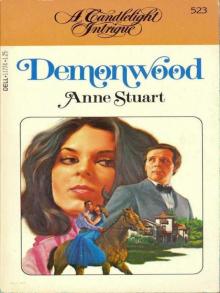 Demonwood
Demonwood Blue Sage (Anne Stuart's Greatest Hits Book 3)
Blue Sage (Anne Stuart's Greatest Hits Book 3) Barrett's Hill
Barrett's Hill Angel's Wings (Anne Stuart's Bad Boys Book 5)
Angel's Wings (Anne Stuart's Bad Boys Book 5) Darkness Before Dawn
Darkness Before Dawn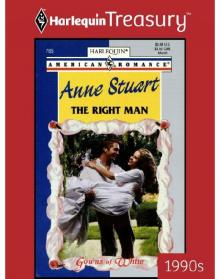 The Right Man
The Right Man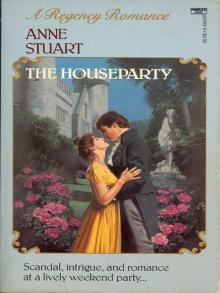 The Houseparty
The Houseparty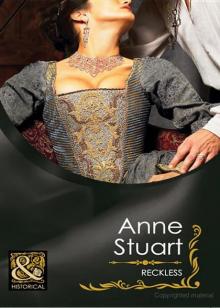 Reckless_Mills & Boon Historical
Reckless_Mills & Boon Historical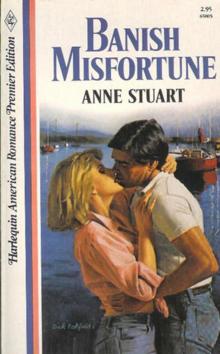 Banish Misfortune
Banish Misfortune Angel's Wings
Angel's Wings Chain of Love
Chain of Love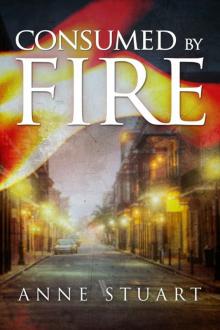 Consumed by Fire (The Fire Series)
Consumed by Fire (The Fire Series) Partners in Crime (Anne Stuart's Bad Boys Book 4)
Partners in Crime (Anne Stuart's Bad Boys Book 4)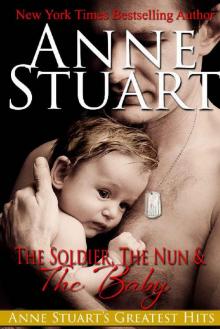 The Soldier, The Nun and The Baby (Anne Stuart's Greatest Hits Book 2)
The Soldier, The Nun and The Baby (Anne Stuart's Greatest Hits Book 2)